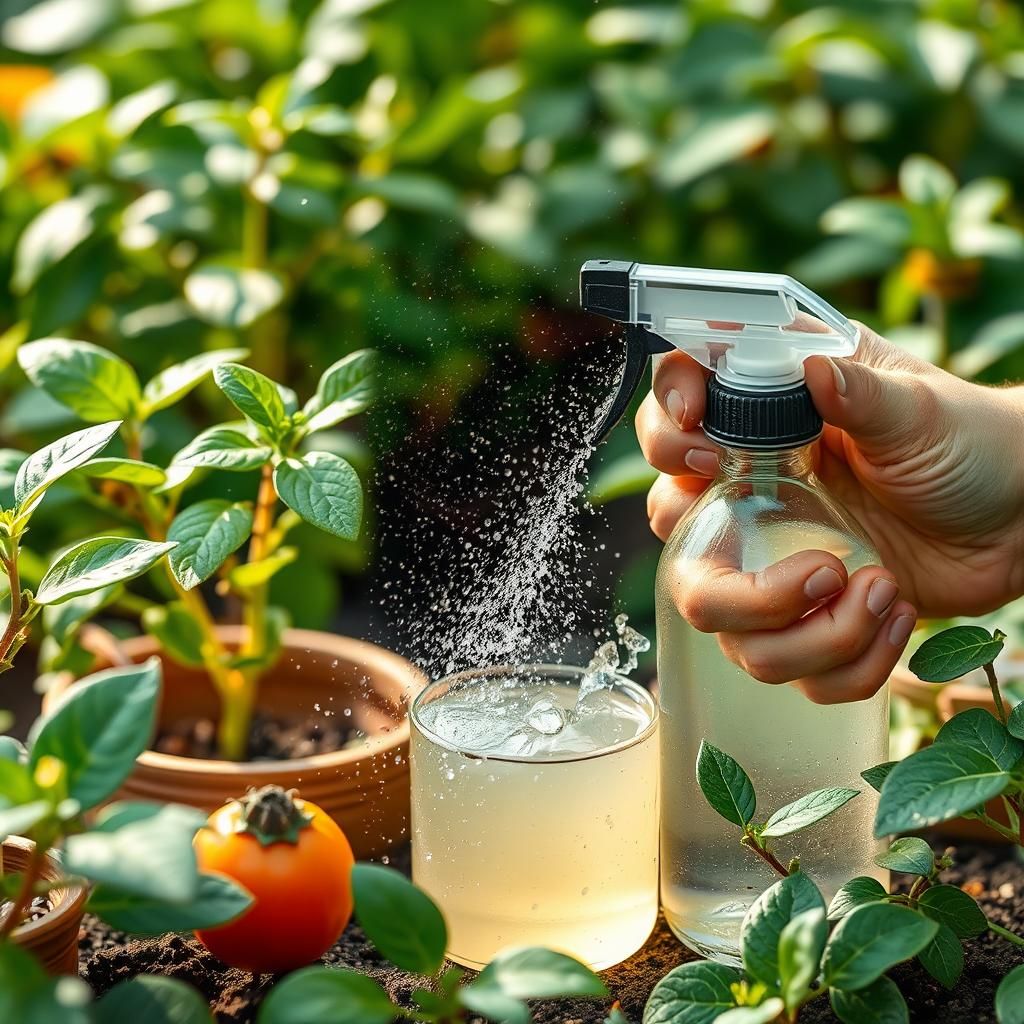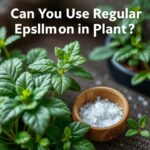Can I Spray My Plants with Vinegar? Discover the Benefits and Tips for Safe Application

Are you curious about using vinegar as a natural solution for your plants? This common household item is often touted for its various benefits in gardening, from pest control to enhancing soil acidity. In this article, we will explore the advantages of spraying your plants with vinegar, including how it can help fend off unwanted pests and improve plant health. Additionally, we'll provide essential tips for safe application, ensuring your plants thrive without adverse effects. Discover the potential of vinegar in your gardening routine and learn how to use it effectively for the best results.
Is Spraying Vinegar Safe for My Plants?
Spraying vinegar on plants can be effective in controlling weeds and pests due to its high acidity, but caution is necessary as it can also harm your plants. If used undiluted, vinegar can cause severe damage to desirable plants by burning their leaves and inhibiting growth. It is recommended to dilute vinegar with water, typically in a ratio of 1 part vinegar to 3 parts water, to minimize the risk of harming your plants while still reaping its benefits as a natural herbicide or pest deterrent.
What Type of Vinegar Should I Use?
When considering spraying vinegar on your plants, the most commonly used type is white vinegar due to its high acetic acid content, which ranges from 5% to 20%. Although apple cider vinegar is another option, it is generally less effective for pest control because of its lower acidity. For best results, stick to white vinegar, especially for tackling persistent weeds and unwanted insects.
How Does Vinegar Affect Different Plants?
Vinegar's acidic nature can have varying effects on different types of plants. While it may effectively kill weeds and unwanted grass, many garden plants like tomatoes, peppers, and herbs can suffer if exposed to vinegar directly. It is important to spot-treat unwanted plants and keep dilution in mind to prevent harming the desired plants in your garden.
Can Vinegar Be Used as a Pest Deterrent?
Yes, vinegar can act as a natural pest deterrent against various insects, such as aphids and mites. Spraying a diluted solution of vinegar on the affected plants can create an unpleasant environment for these pests. However, be careful not to oversaturate the plants, as too much vinegar can lead to leaf burn or damage the plant’s overall health.
How Often Should I Spray Vinegar on My Plants?
The frequency of spraying vinegar on plants depends on the severity of the pest problem or weed issue. For evident infestations, applying the solution once a week may be beneficial, while for lighter issues, bi-weekly applications can suffice. It's essential to monitor the plants' response to the vinegar treatment and adjust your spraying schedule accordingly.
What Precautions Should I Take When Using Vinegar on Plants?
When using vinegar as a treatment, it's vital to take precautions to protect desired plants from potential harm. Always test a small area before widespread application, ensure proper dilution, and target the spray directly onto weeds or pests rather than surrounding plants. Wearing gloves and protective eyewear is also advisable to prevent skin and eye irritation from vinegar contact.
| Aspect | Details |
|---|---|
| Type of Vinegar | White vinegar is most effective; apple cider vinegar is less effective. |
| Effect on Plants | Can kill weeds but may harm desirable plants if not diluted. |
| Pest Deterrent | Natural deterrent against certain insects when sprayed directly. |
| Spraying Frequency | Weekly for severe infestations; bi-weekly for lighter issues. |
| Precautions | Test a small area, dilute properly, and avoid contact with skin. |
Can I spray vinegar directly on my plants?

Spraying vinegar directly on your plants can be a controversial topic, as its effects can vary based on the type of plant and the concentration of the vinegar used. Vinegar is an acid, and it can have both beneficial and harmful effects on your garden. While it is often used as a natural herbicide, it is crucial to exercise caution, as it can also damage or kill desirable plants if not used properly.
Benefits of Using Vinegar in the Garden
Using vinegar in your garden has several potential benefits, particularly when it comes to pest control and weed management. Here are some advantages:
See also:
- Natural Herbicide: Vinegar with high acetic acid concentration can effectively kill unwanted weeds.
- Pest Deterrent: Its strong smell may repel certain pests, reducing their population.
- pH Adjustment: Vinegar can help to lower soil pH, which may benefit acid-loving plants.
Risks of Spraying Vinegar on Plants
Despite its benefits, there are several risks associated with spraying vinegar directly on plants. It is important to consider the following:
- Potential Burn: Vinegar can damage leaves, leading to brown spots or even plant death.
- Affection on Soil Nutrients: Frequent use can alter soil chemistry, potentially harming beneficial bacteria.
- Non-Selective Action: It can kill both weeds and desirable plants, making it a less ideal option for targeted applications.
How to Use Vinegar Safely on Plants
If you decide to use vinegar, it is essential to do so safely to minimize the risks. Consider these guidelines:
- Dilution: Mix vinegar with water to reduce its acidity, making it safer for plants.
- Spot Treatment: Apply directly to weeds only, avoiding contact with friendly plants.
- Timing: Spray on sunny days when plants are dry to minimize the risk of burn.
Alternatives to Vinegar for Plant Care
If you're concerned about using vinegar, several alternatives can achieve similar results without the associated risks. Here's a list of options:
- Salt: Can be used for weed control but should be applied sparingly due to potential soil salinity issues.
- Soap Solutions: A mixture of water and dish soap can help control pests without harming plants.
- Neem Oil: A natural pesticide that effectively targets various pests while being safe for most plants.
Conclusion: When to Use Vinegar in Gardening
Before spraying vinegar on your plants, consider whether the potential benefits outweigh the risks for your specific situation. Here are circumstances where it might be appropriate:
- Weed Issues: Use vinegar as a last resort for persistent weeds.
- Insect Infestation: Apply diluted vinegar cautiously on leaves affected by pests.
- Testing Soil pH: If you know your plants thrive in acidic conditions, vinegar may be useful when used with care.
Is it okay to water plants with vinegar?

Watering plants with vinegar is a topic that sparks interest due to the potential benefits and drawbacks associated with vinegar’s acidity. While vinegar can be used in small amounts for certain purposes, it is generally not recommended to water plants directly with vinegar. Here’s a detailed look at why this practice might be problematic, along with some related subtopics.
Understanding Vinegar and Its pH Level
Vinegar is an acidic substance with a typical pH level ranging from 2 to 3, depending on the type. This level of acidity can be detrimental to many plants, which thrive in a more neutral pH range (around 6 to 7). When plants encounter vinegar:
- Root Damage: The strong acidity of vinegar can cause harm to a plant's roots, leading to reduced nutrient absorption.
- Soil pH Alteration: Regular application of vinegar can drastically alter the pH balance of the soil, making it inhospitable for many plants.
- Microbial Imbalance: Soil microorganisms essential for plant health may be adversely affected, disrupting the ecosystem surrounding plant roots.
Possible Benefits of Vinegar for Plants
While using vinegar as a watering solution isn't advisable, there are specific instances where it may be beneficial in small amounts. These include:
- Pest Control: Diluted vinegar can be used as a natural pesticide, particularly against ants and some aphid species.
- Weed Management: Vinegar can effectively act as a natural herbicide for unwanted weeds when sprayed directly on them.
- Fungal Treatment: A vinegar solution is sometimes used to combat mild fungal infections on foliage.
How to Use Vinegar Safely with Plants
If you choose to use vinegar in your gardening practices, it's crucial to apply it correctly to avoid damaging the plants. Consider the following steps:
- Dilution: Always dilute vinegar with water; a commonly recommended ratio is one part vinegar to three parts water.
- Spot Treatment: Apply the diluted solution directly to pests or weeds instead of watering plants with it.
- Test First: Test the solution on a small area of the plant to observe any adverse reactions before application on a larger scale.
Alternatives to Vinegar for Plant Care
Instead of vinegar, there are various alternatives that can support plant health, such as:
See also:
- Compost: A great source of nutrients, compost enriches soil without altering its pH significantly.
- Organic Fertilizers: These provide balanced nutrition to plants and can improve soil structure.
- Natural Insect Repellents: Use soaps or neem oil as effective alternatives for pest management.
Conclusion on Vinegar Use in Gardening
While vinegar can serve particular roles in gardening, watering plants with vinegar is not advisable due to the high acidity and potential damage to the plant and soil health. If you are considering using vinegar for specific gardening tasks, always remember the importance of moderation and careful application.
What does vinegar do to the plants?
:max_bytes(150000):strip_icc()/vinegar-as-a-natural-weed-killer-2132943-final-5c1a5edf46e0fb00012f1032.png)
Vinegar, primarily composed of acetic acid, is often used in household settings for various purposes, including cooking and cleaning. However, its effects on plants can be both beneficial and detrimental, depending on how it is used. Below is a detailed exploration of what vinegar does to plants, along with related subtopics.
Benefits of Vinegar for Plants
Vinegar can serve as a natural remedy and benefit plants in several ways:
- Weed Control: Vinegar is an effective herbicide. The acetic acid in vinegar can kill weeds by drying them out.
- Soil pH Adjustment: Vinegar can help to acidify alkaline soils, benefiting acid-loving plants.
- Pest Repellent: A vinegar solution can deter certain pests, such as ants and fruit flies, from your garden.
How to Use Vinegar in the Garden
Using vinegar wisely can yield positive results for your plants. Here are some methods:
- Diluted Spray: Mix vinegar with water (1 part vinegar to 3 parts water) and spray on weeds, avoiding direct contact with desirable plants.
- Acidifying Soil: Use vinegar to water plants that thrive in acidic conditions, such as blueberries, in moderation.
- Pest Control: Spray a solution around the garden's perimeter to help keep pests at bay.
Potential Risks of Vinegar for Plants
While vinegar can be beneficial, it can also pose risks if not used correctly:
- Plant Damage: Undiluted vinegar can harm plants by damaging their leaves and roots.
- Soil Health: Overuse of vinegar can alter the soil pH too much, negatively impacting beneficial microbes.
- Effect on Nutrients: High acidity from vinegar can make essential nutrients unavailable to plants.
Vinegar as a Fertilizer
Some gardeners use vinegar as a fertilizer due to its nutrient content. Here’s how it can work:
- Microbial Growth: Vinegar can promote the growth of specific soil microbes that aid in nutrient absorption.
- Trace Nutrients: Vinegar contains small amounts of nutrients that can contribute to plant health when diluted.
- Application Method: Use it sparingly, mixed with water, to avoid overwhelming your plants with acidity.
Alternative Uses of Vinegar in Gardening
Beyond direct application to plants, vinegar has several alternative uses:
- Cleaning Tools: Use vinegar to clean gardening tools, preventing the spread of diseases between plants.
- Preserving Cut Flowers: Adding vinegar to the water of cut flowers can prolong their freshness and color.
- Mulch Enhancer: Vinegar mixed into mulch can help maintain a suitable soil pH when applied correctly.
Questions from Our Readers
Can I spray my plants with vinegar?
Yes, you can spray your plants with vinegar, but it should be done with caution. Vinegar is acidic, and while it can help control weeds and pests, it may also harm your plants if used in high concentrations. Always dilute it with water before applying, and test it on a small area first.
What types of vinegar are safe for plants?
The most commonly used vinegar for plants is white vinegar or apple cider vinegar. Both have acetic acid, which can be effective against pests and fungi. However, avoid using flavored or balsamic vinegars, as they may contain additional ingredients that could harm your plants.
See also:
How do I dilute vinegar for spraying my plants?
To safely use vinegar as a spray, mix one part of vinegar with three parts of water. This dilution helps to reduce the acidity and minimizes the risk of damaging your plants, while still providing some benefits against pests and weeds.
How often can I spray my plants with vinegar?
It's recommended to spray your plants with vinegar no more than once every two weeks. Frequent application can lead to a buildup of acidity, which can stress or kill your plants over time. Always monitor your plants for any adverse reactions after spraying.

If you want to read more articles like Can I Spray My Plants with Vinegar? Discover the Benefits and Tips for Safe Application, we recommend you check out our Plants category.
Leave a Reply
Related Articles